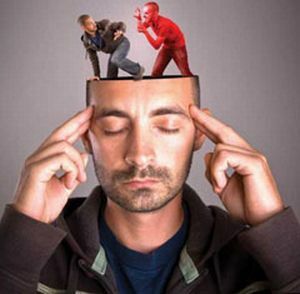 The term "psychoneurosis" is used to refer to one of the groups of neuroses with which the disease has a similar symptomatology, but a different origin.
The term "psychoneurosis" is used to refer to one of the groups of neuroses with which the disease has a similar symptomatology, but a different origin.
The difference between psychoneurosis is the manifestation of a conflict between id and ego. In this case, unlike psychosis, the patient does not lose contact with the objective reality and realizes the presence of the problem.
Specialists distinguish 3 types of psychoneurosis: obsessive-compulsive disorder, phobia( or anxiety hysteria), and conversion hysteria.
Freud singled out 2 categories of the disease. To the first( neuroses of transference) phobias, hysteria and neuroses of compulsive states are included. The second category( narcissistic neuroses) includes schizophrenia and melancholia.
Aggravating factors
The psychoneurotic disorder may cause excessive physical and mental stress. With such stress, first-graders often encounter.
In adults, deep emotional upheavals cause significant changes in professional and personal life: job changes, dismissals, major career failures, lack of money, divorce or marriage, death of a close relative.
Internal pressure is exerted from outside, a sense of guilt, doubts about the correctness of their actions.
The reason for the emergence of psychoneurosis can become diseases such as AIDS, influenza, tuberculosis and others. Disorder results in a general exhaustion of the body, for example, after a long illness or a hunger strike. One of the common causes is a disruption in the functioning of the central nervous system.
Symptomatic symptoms of
Symptoms of psychoneurosis are diverse and vivid:
- Emotional instability .People with psychoneurosis have sharp mood swings. They are whiny,
 are vulnerable, touchy. Patients often feel anxiety or even fear for no apparent reason.
are vulnerable, touchy. Patients often feel anxiety or even fear for no apparent reason. - Instability to stresses .A person is not able to respond adequately to stressful situations, to mobilize his efforts to solve a problem. He either reacts aggressively, or falls into despair.
- Decreased performance of .Patients experience increased fatigue, forgetfulness, inhibition of mental processes.
- Constant reproduction in memory of psychotraumatic situations .This behavior is typical for almost every person. However, the psychoneurotic is inclined to consider traumatizing any insignificant or unusual situation.
- Inadequate self-esteem of , which can be dramatically underestimated or sharply exaggerated.
- Contradictory value system .Depending on the mood, the patient extols or belittles the virtues of the same object.
In addition, the disease has physical symptoms that are experienced in parallel, prevail over the mental or completely absent. People suffering from this kind of neurosis often complain of abdominal pain, heart and headaches.
They have a violation of sleep and appetite. There are often panic attacks lasting from several minutes to several hours. Attacks can be accompanied by increased sweating, palpitations, frequent urge to urinate and defecate.
Periodic disturbances occur in the vestibular apparatus. Possible problems with potency and the disappearance of sexual desire. Patients are prone to excessive care for their health, as they often find symptoms of one or another disease( hypochondria).
Tactics of Patient Management
 Psychoneurotic disorders occur in 50% of people around the world. That's why doctors should not treat them as mental illnesses, and their patients as mentally ill. In a life of each person there are situations provoking the strongest stress which can last long enough and cause unpleasant emotions all life.
Psychoneurotic disorders occur in 50% of people around the world. That's why doctors should not treat them as mental illnesses, and their patients as mentally ill. In a life of each person there are situations provoking the strongest stress which can last long enough and cause unpleasant emotions all life.
When a patient turns to a clinic with any symptoms, the attending physician should not simply invite the patient to take tests, but pay attention to his state of mind.
The doctor needs to find out in a delicate manner whether the patient has encountered an unpleasant situation at work or in his personal life. Perhaps the patient will want to share what worries him. Pay attention to the mood and state of mind is extremely important.
Often patients complain of pain in the heart or stomach, insomnia or increased fatigue. The doctor tries to find the cause, prescribes the patient medication for the treatment of non-existent diseases. And the source of many health problems is a deep emotional trauma.
Assisting
Suspected of having symptoms of psychoneurosis, it is necessary to immediately consult a specialist and not self-medicate. In the early stages it is permissible to visit a psychologist who will help to identify the problem and effectively deal with it. 
It should be remembered that the earlier the joint work of the doctor with the patient is started, the sooner the treatment will end, and the less money it will have to spend. Do not give up visiting a therapist. The patient may need a specialist with a medical background, which the psychologist does not have.
Psychotherapy is the main method of treatment of psychoneurotic disorders. In most cases, the patient only needs to work out the situation that caused depressing emotions, to defeat the complex, which hinders personal happiness. Drug treatment is limited.
For the treatment of psychoneuroses, strong drugs are used, suppressing not only painful experiences, but also the psyche of the patient. That's why drugs are used only in the most extreme cases.
The leading role in successful treatment is played by the patient's correct attitude, his desire to get out of depression, get rid of fear, anxiety and stress and return to normal life.
This will help not only drugs and psychotherapy. The patient needs a change in the situation: an excursion, a long trip or even a transfer to another city.
The dangers and consequences of
The psychoneurosis is dangerous because a person does not realize the seriousness of the problem that has arisen. Many people believe that an appeal to a specialist is only necessary for a mentally unhealthy person.
A visit to a psychologist is often considered a sign of weakness and inability to solve their problems on their own. The rejection of medical care is especially common among men who are convinced that members of the stronger sex can not afford such behavior.
 Such erroneous judgments lead to the fact that a person remains alone with his problem, which not only does not disappear, but also constantly increases.
Such erroneous judgments lead to the fact that a person remains alone with his problem, which not only does not disappear, but also constantly increases.
The patient begins to look for all kinds of exits from stressful situations and finds them in the use of alcohol, narcotic substances, etc., which leads to physiological and psychological dependence. It is not uncommon for a patient to find a way out only in suicide.
The body and the soul of a person are subject to diseases. Having felt pain in this or that organ, the patient immediately turns to the doctor. At the same time, not everyone is eager to solve emotional problems. Meanwhile, an unresolved internal conflict often turns into a serious disease of the body.



